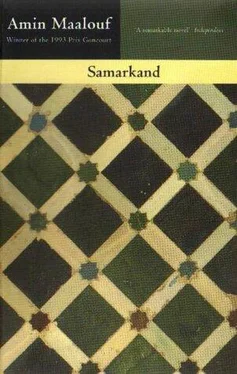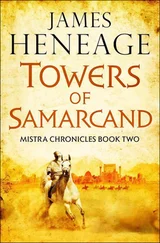‘He was friendly. Besides, we met every morning after that. I still spoke very little and he stated that he was happy that an American could share his views so thoroughly. At the end of his fourth monologue, which was just as spirited, this august gentleman invited me to dine with him at his home; he was so certain of obtaining my agreement yet again that he hailed a coach before I could even formulate a reply. I must admit that I have never regretted it. He was called Charles-Hubert de Luçay and lived in a mansion on Boulevard Poissonière. He was a widower. His two sons were in the army and his daughter was going to become your mother.’
She was eighteen and my father was ten years older. They observed each other in silence throughout long patriotic harangues. From 7 August, when it became clear, after three defeats in a row, that the war was lost and that the national territory was under threat, my grandfather became less verbose. As his daughter and future son-in-law busied themselves trying to temper his melancholy a complicity sprang up between them. From then on, a glance was enough to decide which of them was going to intervene and with the medicine of which argument.
‘The first time we were alone, she and I in the huge salon, there was a deathly silence — followed by a burst of laughter. We had just discovered that, after numerous meals taken together, we had never addressed a word to each other directly. It was sweet, knowing and uncontrolled laughter, but it would have been unbecoming to prolong it. I was supposed to speak first. Your mother was clutching a book to her blouse, and I asked her what she was reading.’
At that very moment, Omar Khayyam entered into my life. I should almost say that it gave birth to me. My mother had just acquired Les Quatrains de Khéyam , translated from the Persian by J.B. Nicolas, formerly chief dragoman of the French Embassy to Persia, published in 1867 by the Imperial Press. My father had in his luggage the 1868 edition of Edward FitzGerald’s The Rubáiyát of Omar Khayyám .
‘Your mother’s rapture was no better hidden than mine. We were both sure that our life lines were going to join. At no moment did we think that it could just be a simple coincidence that we were reading the same book. Omar appeared to us instantly like fate’s password — to ignore it would have been almost sacrilegious. Naturally, we had said nothing of what was going on inside us, the conversation centred on the poems. She informed me that Napoleon III in person had ordered the publication of the work.’
At that time, Europe had just discovered Omar. Some specialists, in truth, had spoken of him earlier in the century, his algebra had been published in Paris in 1851 and articles had appeared in specialized reviews. But the western public was still unaware of him, and, in the east itself, what was left of Khayyam? A name, two or three legends, some quatrains of indefinite authorship and a hazy reputation as an astrologer.
When an obscure British poet, FitzGerald, decided to publish a translation of seventy-five quatrains in 1859 there was indifference. The book was published in an edition of two hundred and fifty copies; the author offered some to his friends and the rest were selling very slowly at the book-shop of Bernard Quaritch. ‘Poor old Omar, he apparently was of interest to no one,’ so FitzGerald wrote to his Persian teacher. After two years the publisher decided to sell off the stock: from an initial price of five shillings, the Rubaiyaat went down to a penny, sixty times less. Even at this price, few were sold until the moment when two literary critics discovered it. They read it and were amazed by it. They came back the next day and bought up six copies to give out. Feeling that some interest was about to be aroused, the editor raised the price to two pence.
And to think that on my last trip to England I had to pay the same Quaritch, now finely established in Piccadilly, four hundred pounds sterling for a copy which he had kept from that first edition!
However, success was not immediate in London. It had to come from Paris where M. Nicolas published his translation, where Théophile Gautier had to write, in the pages of the Moniteur Universel a resounding ‘Have you read the Quatrains of Kéyam?’ And welcome ‘this absolute freedom of spirit which the boldest modern thinkers can hardly equal’, and Ernest Renan had to add: ‘Khayyam is perhaps the most curious man to study in order to understand what the unfettered genius of Persia managed to become within the bounds of Muslim dogmatism’ — in order for Fitzgerald and his ‘poor old Omar’ to come out of their anonymity. The awakening was thunderous. Overnight all the images of the orient were assembled around the sole name of Khayyam. Translation followed translation, editions of the work multiplied in England and then in several American cities ‘Omar’ societies were formed.
To reiterate, in 1870 the Khayyam vogue was just starting. The circle of fans of Omar was growing every day, without yet having transcended the circle of intellectuals. After this shared reading matter brought my father and mother together, they started to recite the quatrains of Omar and to discuss their meaning: were wine and the tavern, in Omar’s pen, purely mystical symbols, as Nicolas stated? Or were they, on the other hand, the expression of a life of pleasure, indeed of debauchery, as FitzGerald and Renan claimed? These debates took on a new taste in their mouths. When my father evoked Omar, as he caressed the perfumed hair of his beautiful girl, my mother blushed. It was between two amorous quatrain that they exchanged their first kiss. The day they spoke of marriage, they made a vow to call their first son Omar.
During the 1890s, hundreds of little Americans were also given that name: when I was born on 1 March 1873 it was not yet common. Not wishing to encumber me too much with this exotic first name, my parents relegated it to second place, in order that I might, if I so desired, replace it with a discrete O; my school friends supposed that it stood for Oliver, Oswald, Osborne or Orville and I did not disabuse anyone.
The inheritance which was thus handed down to me could not fail to arouse my curiosity about this remote godfather. At fifteen I started to read everything about him. I had made a plan to study the language and literature of Persia and to make a long visit there. However, after a bout of enthusiasm I cooled down. Indeed, in the opinion of all the critics, FitzGerald’s verses constituted a masterpiece of English poetry, but they had only a remote connection with what Khayyam could have composed. When it came to the quatrains themselves, some authors quoted almost a thousand, Nicolas had translated more than four hundred, while some thorough specialists only recognized a hundred of them as being ‘probably authentic’. Eminent orientalists went as far as to deny that a single one could be attributed to Omar with certainty.
It was believed that there could have existed an original book which once and for all would have allowed the real to be distinguished from the false, but there was nothing to lead one to believe that such a manuscript could be found.
Finally I turned away from the person, as I did from the work. I came to see my middle initial O as the permanent residue of parental childishness — until a meeting took me back to my first love and directed my life resolutely in the footsteps of Khayyam.
It was at the end of the summer of 1895 that I embarked for the old world. My grandfather had just celebrated his seventy-sixth birthday and had written tearful letters to me and my mother. He was eager to see me, even if it were only once, before his death. Having finished my studies I rushed off and on the ship I readied myself for the role I would have to play — to kneel down at his bedside, to hold his frozen hand bravely while listening to him murmur his last orders.
Читать дальше












